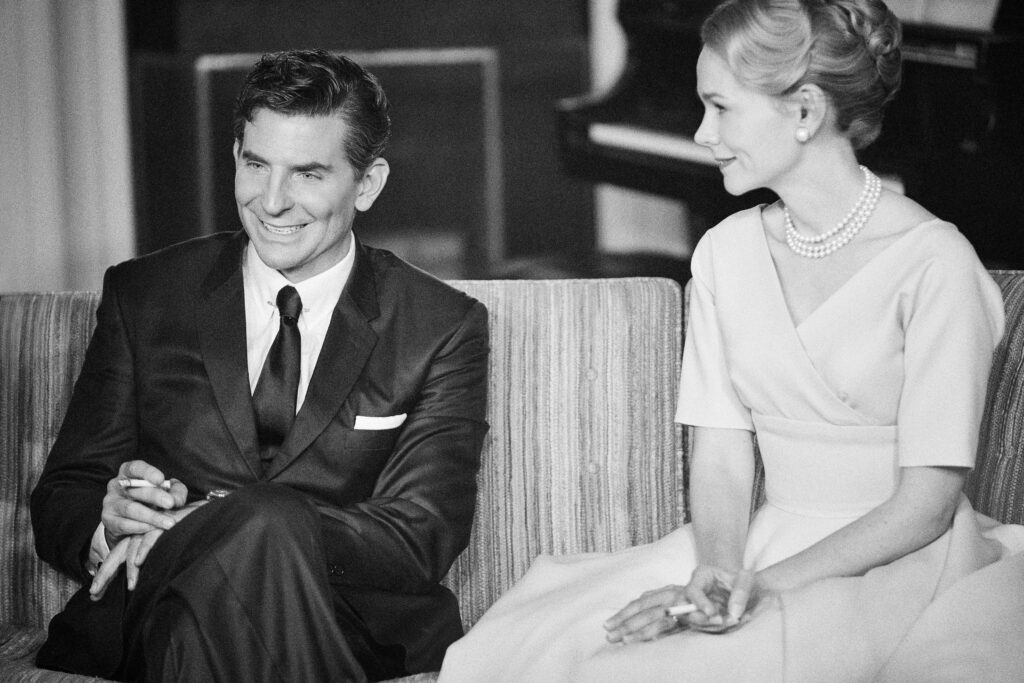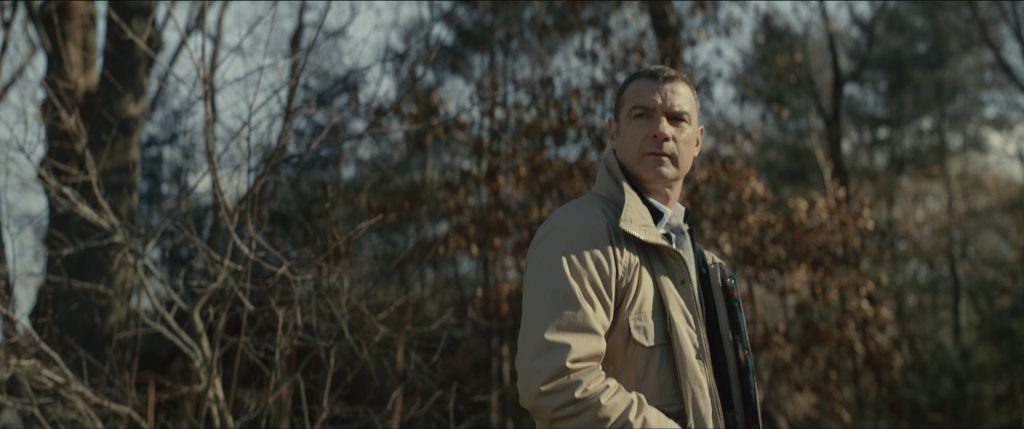May 10, 2024
by Carla Hay

Directed by Ethan Hawke
Culture Representation: Taking place in Georgia and in New York, in the late 1940s and early 1950s, the biopic drama film “Wildcat” features a predominantly white cast of characters (with a few African Americans) representing the working-class, middle-class and wealthy.
Culture Clash: Young author Flannery O’Connor struggles with various issues, including writer’s block, sexism, lupus, a domineering mother, and religion, specifically Catholicism.
Culture Audience: “Wildcat” will appeal primarily to fans of O’Connor, filmmaker Ethan Hawke and slow-paced and uneven biopics.

“Wildcat” wants to be an edgy and experimental biopic of author Flannery O’Connor, but it’s just a pile-on of overly pretentious rambling that’s trying too hard to look clever. Everything in this drab drama looks phony and forced, not natural or organic. This is the type of pompous movie that gets into major film festivals mainly because the director is famous. “Wildcat” had its world premiere at the 2023 Telluride Film Festival, and later screened at other festivals that year, such as the Toronto International Film Festival, the Zurich Film Festival and the Stockholm International Film Festival.
Ethan Hawke directed “Wildcat,” which he co-wrote with Shelby Gaines. “Wildcat” (starring Maya Hawke, daughter of Ethan Hawke and Uma Thurman) is based on some of O’Connor’s short stories. (For the purposes of this review, the real O’Connor will be referred to as O’Connor, while the Flannery O’Connor character in the movie will be referred to as Flannery.) “Wildcat” (which takes place in the late 1940s and early 1950s) is a mixture of realism and surrealism. In several scenes, O’Connor’s short stories come to life as she’s writing them, with Maya Hawke portraying not only O’Connor but also the protagonists of these short stories.
It’s an ambitious concept for a movie that only works in short spurts and then gets muddled and meanders for long stretches. Parts of “Wildcat” look better-suited for a stage play (especially in poorly lit scenes were people just talk in rooms), while other parts of the movie fit better in a cinematic format. For example, Flannery is fascinated with peacocks, and one of the best shots in the film involves a visual image of Flannery with peacock feathers unfurling behind her, like an art installation. But artsy visuals and self-indulgent monologues (of which this movie has plenty) cannot turn “Wildcat” into a very good movie.
People who are not familiar with O’Connor might be rolling their eyes at how O’Connor in “Wildcat” is depicted with every checklist cliché of an artist who died young. (At the age of 39, she died of lupus in 1964). Flannery in “Wildcat” is a moody and insecure loner, with a “tortured soul.” She puts her writing above everything else in her life. And then, she’s frustrated that her personal relationships are unfulfilling or downright disastrous.
“Wildcat” opens with a scene that might confuse some viewers. It’s a fictional trailer for a fictional 1964 movie called “Star Drake,” based on one of Flannery’s semi-autobiographical short stories. Flannery is supposed to be imagining this movie trailer in her head. “Wildcat” depicts many fantasies imagined by Flannery. In this imaginary “Star Drake” movie trailer, the movie’s plot is described as “the outspoken story of an indiscreet woman.”
Flannery portrays the title character of “Star Drake,” who is a young writer who temporarily stays with a middle-aged couple and causes havoc in their lives as a femme fatale. It’s no doubt partially inspired by O’Connor’s real-life 1949 experience of temporarily living with classic book translator Robert Fitzgerald and his wife Sally Fitzgerald in Ridgefield, Connecticut, although O’Connor’s real-life visit wasn’t as dramatic as it’s portrayed in “Star Drake.”
Throughout “Wildcat,” the movie switches back and forth between Flannery’s “real life” and the “fantasies” inspired by her short stories. An early scene in “Wildcat” takes place in 1950, when Flannery (who spent most of her life living in her home state of Georgia) has a tense meeting in New York City with her book publisher John Selby (played by Alessandro Nivola), who admittedly doesn’t understand the eccentric Flannery and her writing style. (“Wildcat” was actually filmed in Kentucky.)
John thinks Flannery’s angst-filled short stories aren’t very ladylike. He tells her that she doesn’t have to write like “she’s picking a fight” with readers. John also suggests that Flannery give him an outline of what she’s writing before she turns in the draft. However, Flannery explains that she doesn’t do outlines. She just writes what comes to her.
“Wildcat” doesn’t want to dwell on harsh realities of being a female author in a male-dominated field in this particular time period. Flannery, for all of her “struggling artist” posturing, is never really seen struggling with harmful sexism or poverty in “Wildcat.” The way it looks in “Wildcat,” the people who are Flannery’s biggest obstacles in life are women: herself and her domineering mother.
Flannery has an encouraging mentor is Robert “Cal” Lowell (played by Philip Ettinger), a bachelor who isn’t much older than she is and is a great admirer of Flannery’s work. Flannery gets accepted into a writer’s workshop at an unnamed university. Cal is Flannery’s writing instructor for this workshop, where Flannery is one of only a few female students.
This part of the movie seems inspired by O’Connor’s real-life stint at the Iowa Writers’ Workshop at the University of Iowa. The character of Cal seems to be based on a combination of the real-life Paul Engle, who was the workshop leader. In “Wildcat,” Flannery and Cal they seem to be attracted to each other for more than just professional reasons.
Some of the dialogue in “Wildcat” is cringeworthy. In a scene taking place at train station, Cal says to Flannery: “I love you, Flannery. That’s not a [marriage] proposal. You know me. I’ve got a lot of eggs to fry.” Flannery responds, “You let me know when you’re done with breakfast then.”
Flannery’s relationship with her widowed mother Regina (played by Laura Linney) is the source of most of Flannery’s conflicts in the movie. Regina is a conservative Catholic who is overbearing and racist. Flannery (who is an only child) moves back home to Georgia to live with Regina and Regina’s gossipy sister Duchess (played by Christine Dye), who becomes Flannery’s closest confidante.
Flannery’s father died of lupus when Flannery was a child. His death is barely mentioned in the movie. In real life, O’Connor’s father Edward, who was a real-estate agent, died in 1937, when she was 8 years old. “Wildcat” never really explores how this tragic death affected Flannery.
Flannery seems to take pride in being an oddball non-conformist, but she also seems conflicted over it. She likes to dress in men’s clothing (much to the dismay of her mother Regina), but the female heroines in her stories are often ultra-feminine and vulnerable. Flannery openly scoffs at and questions the concept of religion, but she sometimes wonders if being a devout Catholic would make her life better. (Liam Neeson as a cameo as a Catholic priest named Father Flynn, who counsels Flannery when she’s at a low point in her life.)
Flannery has lupus, which is a diagnosis that she doesn’t discover until later in the movie. By then, “Wildcat” viewers will see depictions of various characters in Flannery’s short stories. In these short stories that play out in her head and on screen, Flannery usually imagines herself in the role of a young woman who is sexually repressed and/or sexually inexperienced, including Sarah Ruth Cates from “Parker’s Back,” LucyNell Crater from “The Life You Save May Be Your Own,” Mary Grace from “Revelation” and Joy “Hulga” Hopewell from “Good Country People.”
Each of these imaginary heroines is usually controlled and manipulated by an older woman, who is a mother or maternal figure to the heroine—and obviously representative of Regina. In “Wildcat,” Linney also has several roles in the movie, including the roles of Mrs. Crater, Mrs. Turpin and Mrs. Hopewell. Predictably, these bossy characters are argumentative and difficult.
“Wildcat” also has depictions of various love interests of the heroines from these short stories. Obadiah Elihue “O.E.” Parker (played by Rafael Casal) is the tattooed and gun-toting rebel from O’Connor’s “Parker’s Back.” Tom R. Shiftlet (played by Steve Zahn) is the homeless con man from “The Life You Save May Be Your Own” who agrees to marry naïve LucyNell Crater, after Mrs. Crater sells LucyNell into this marriage with cash and the use of Mrs. Crater’s car as a “dowry.” Manley Pointer (played by Cooper Hoffman) is the conniving Bible salesman from “Good Country People.”
Maya Hawke certainly has an admirable acting range that she gets to show in “Wildcat.” Linney is always a pro at what she does. And the rest of the “Wildcat” cast members do reasonably well in their roles. The problem is that you never forget that they are acting in a way that comes across as showboating instead of truly embodying the characters.
The movie’s cinematography consists of mostly of shades of blues and grays, as if to reflect the story’s depressive mood. “Wildcat” doesn’t really have a lot that’s important to say about Flannery O’Connor and her life experiences. Instead, this lethargic movie depicts her as a fever dream of disjointed fantasies that she thinks about when she wants to escape the uncomfortable realities of her life.
Oscilloscope Laboratories released “Wildcat” in select U.S. cinemas on May 3, 2024.






